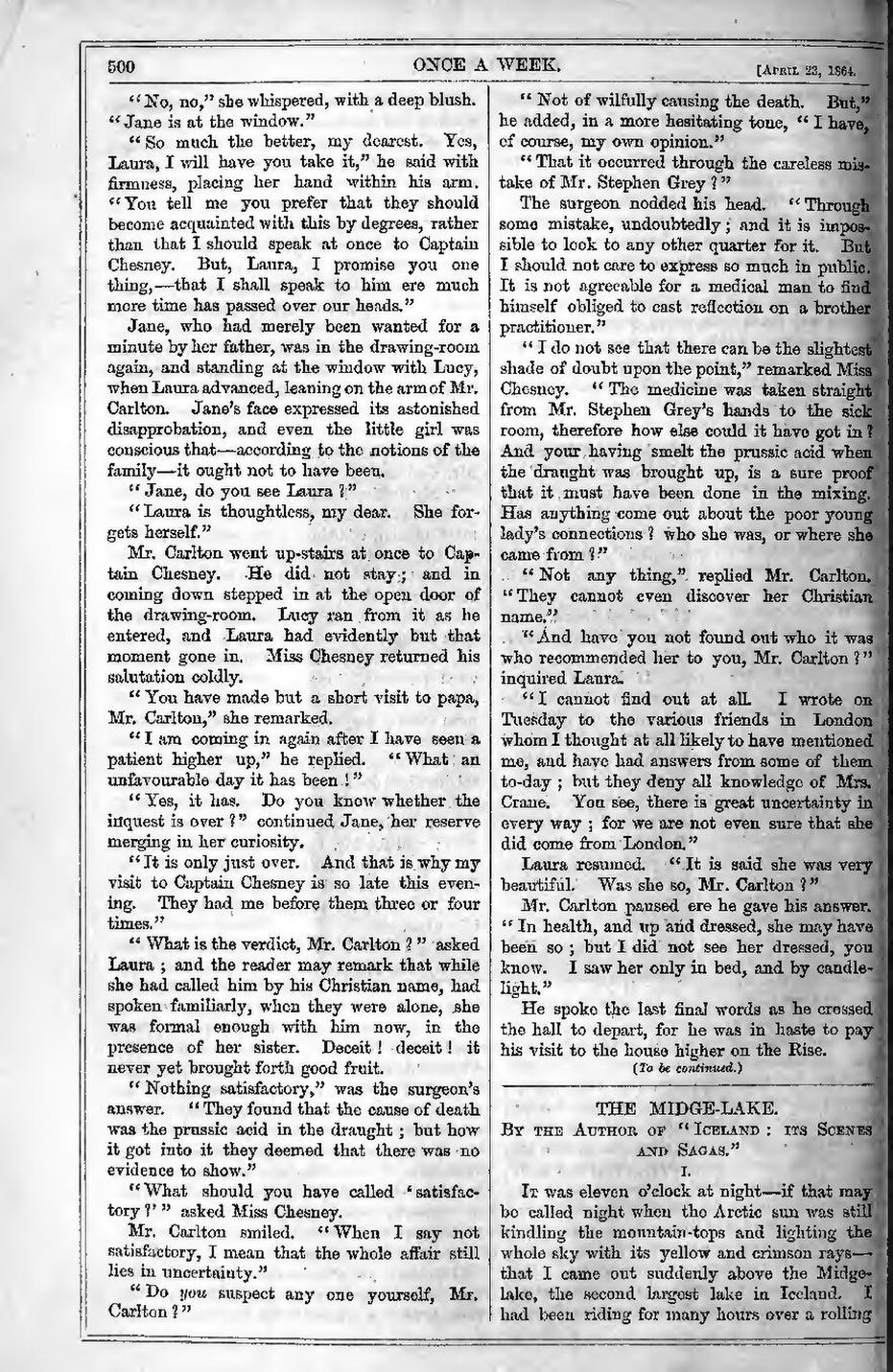“No, no,” she whispered, with a deep blush. “Jane is at the window.”
“So much the better, my dearest. Yes, Laura, I will have you take it,” he said with firmness, placing her hand within his arm. “You tell me you prefer that they should become acquainted with this by degrees, rather than that I should speak at once to Captain Chesney. But, Laura, I promise you one thing,—that I shall speak to him ere much more time has passed over our heads.”
Jane, who had merely been wanted for a minute by her father, was in the drawing-room again, and standing at the window with Lucy, when Laura advanced, leaning on the arm of Mr. Carlton. Jane’s face expressed its astonished disapprobation, and even the little girl was conscious that—according to the notions of the family—it ought not to have been.
“Jane, do you see Laura?”
“Laura is thoughtless, my dear. She forgets herself.”
Mr. Carlton went up-stairs at once to Captain Chesney. He did not stay; and in coming down stepped in at the open door of the drawing-room, Lucy ran from it as he entered, and Laura had evidently but that moment gone in. Miss Chesney returned his salutation coldly.
“You have made but a short visit to papa, Mr. Carlton,” she remarked.
“I am coming in again after I have seen a patient higher up,” he replied. “What an unfavourable day it has been!”
“Yes, it has. Do you know whether the inquest is over?” continued Jane, her reserve merging in her curiosity.
“It is only just over. And that is why my visit to Captain Chesney is so late this evening. They had me before them three or four times.”
“What is the verdict, Mr. Carlton?” asked Laura; and the reader may remark that while she had called him by his Christian name, had spoken familiarly, when they were alone, she was formal enough with him now, in the presence of her sister. Deceit! deceit! it never yet brought forth good fruit.
“Nothing satisfactory,” was the surgeon’s answer. “They found that the cause of death was the prussic acid in the draught; but how it got into it they deemed that there was no evidence to show.”
What should you have called “satisfactory?” asked Miss Chesney.
Mr. Carlton smiled, “When I say not satisfactory, I mean that the whole affair still lies in uncertainty.”
“Do you suspect any one yourself, Mr. Carlton?”
“Not of wilfully causing the death. But,” he added, in a more hesitating tone, “I have, of course, my own opinion.”
“That it occurred through the careless mistake of Mr. Stephen Grey?”
The surgeon nodded his head. “Through some mistake, undoubtedly; and it is impossible to look to any other quarter for it. But I should not care to express so much in public. It is not agreeable for a medical man to find himself obliged to cast reflection on a brother practitioner.”
“I do not see that there can be the slightest shade of doubt upon the point,” remarked Miss Chesney. “The medicine was taken straight from Mr. Stephen Grey’s hands to the sick room, therefore how else could it have got in? And your having smelt the prussic acid when the draught was brought up, is a sure proof that it must have been done in the mixing. Has anything come out about the poor young lady’s connections? who she was, or where she came from?”
“Not any thing,” replied Mr. Carlton, “They cannot even discover her Christian name.”
“And have you not found out who it was who recommended her to you, Mr. Carlton?” inquired Laura.
“I cannot find out at all. I wrote on Tuesday to the various friends in London whom I thought at all likely to have mentioned me, and have had answers from some of them to-day; but they deny all knowledge of Mrs. Crane. You see, there is great uncertainty in every way; for we are not even sure that she did come from London.”
Laura resumed. “It is said she was very beautiful. Was she so, Mr. Carlton?”
Mr. Carlton paused ere he gave his answer. “In health, and up and dressed, she may have been so; but I did not see her dressed, you know. I saw her only in bed, and by candlelight.”
He spoke the last final words as he crossed the hall to depart, for he was in haste to pay his visit to the house higher on the Rise.
THE MIDGE-LAKE.
By the Author of “Iceland: its Scenes and Sagas.”
I.
